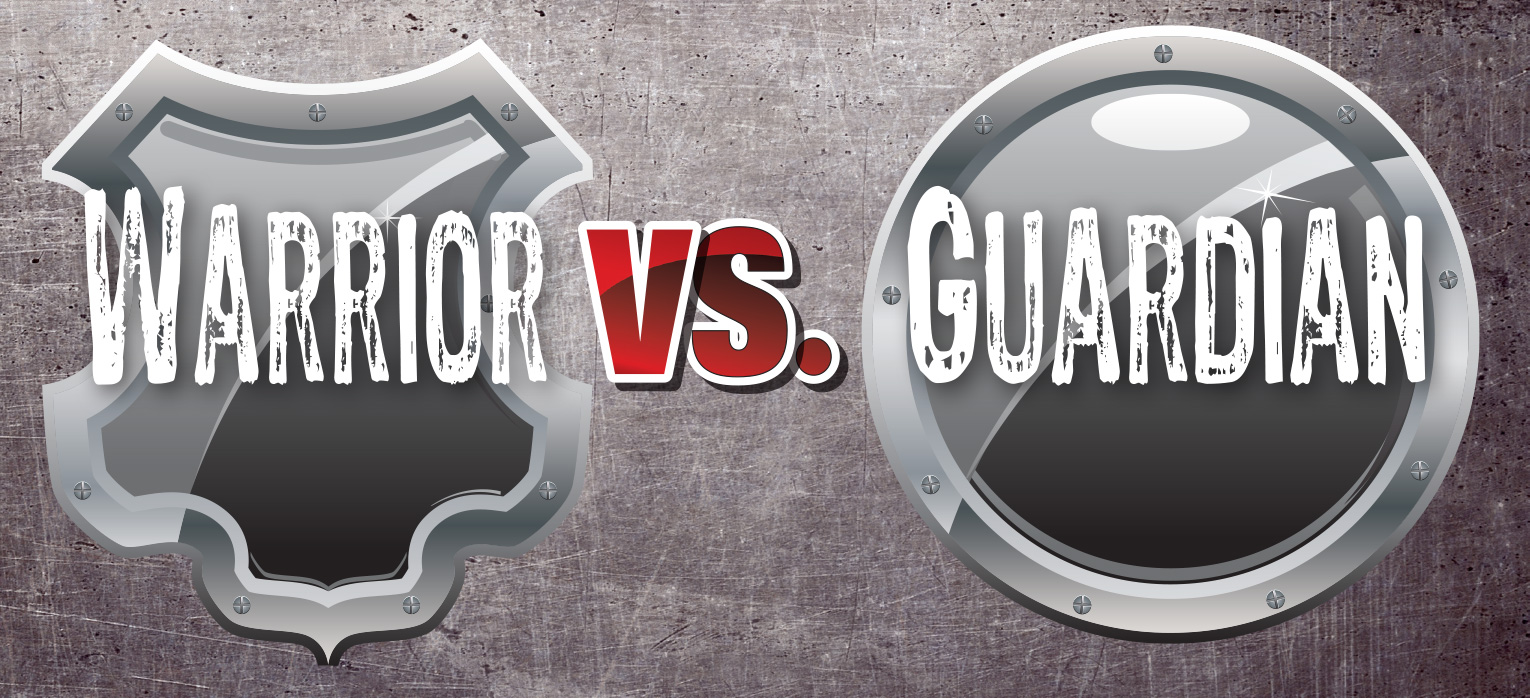
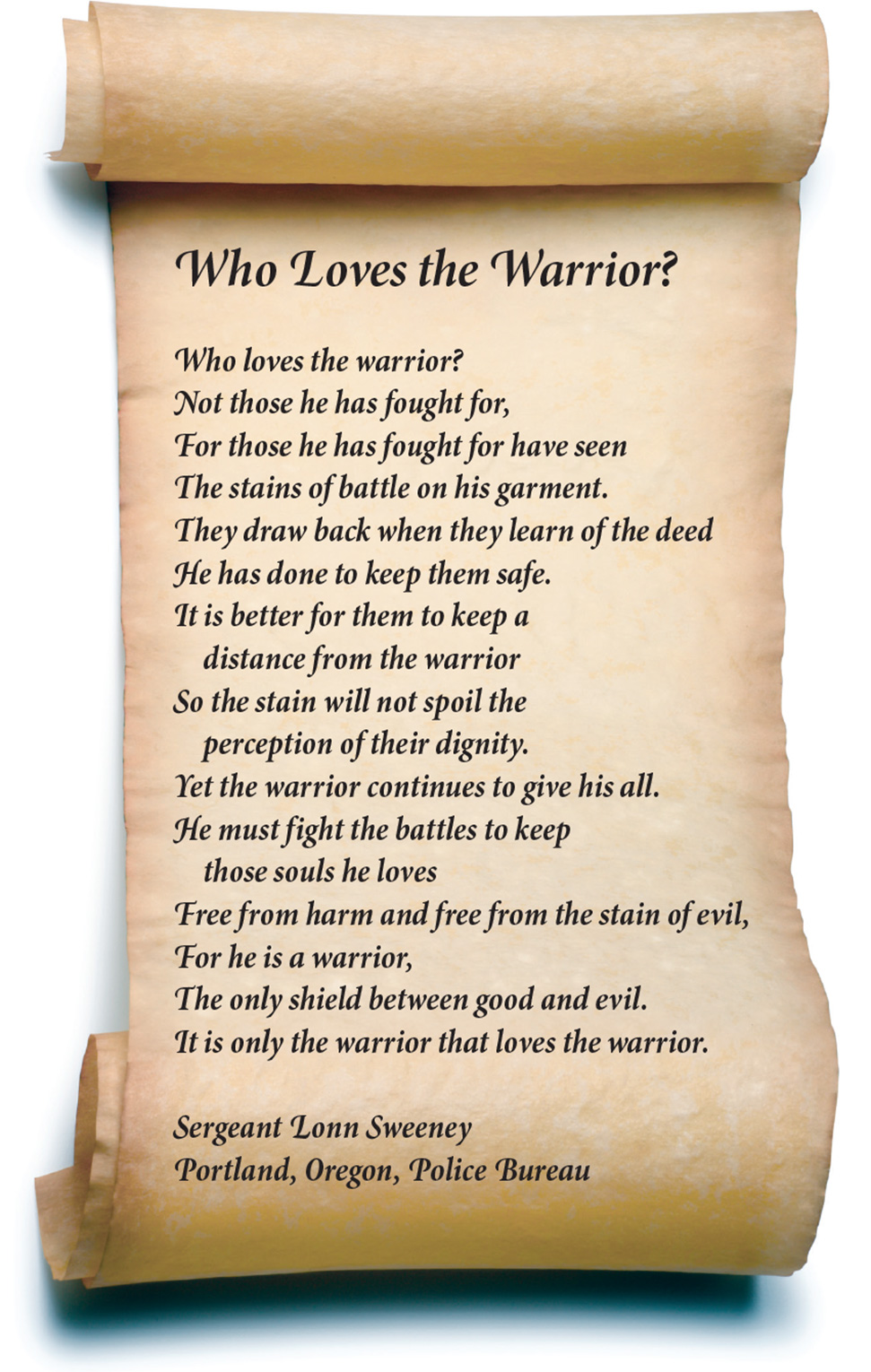 I have been a police officer since the late ’90s. I began my career with the Portland Police Bureau in Portland, Oregon. In 2004, I moved to southern Nevada and began to work for the Las Vegas Metropolitan Police Department. The poem to the right was written by Sergeant Lonn Sweeney of the Portland Police Bureau. When I was hired by the agency, Sweeney was a sergeant and his son was in my Academy class. I first read this poem in 1998, and I liked it, but I didn’t understand it. Now, 20-plus years into the game, I love it, and I completely understand it.
I have been a police officer since the late ’90s. I began my career with the Portland Police Bureau in Portland, Oregon. In 2004, I moved to southern Nevada and began to work for the Las Vegas Metropolitan Police Department. The poem to the right was written by Sergeant Lonn Sweeney of the Portland Police Bureau. When I was hired by the agency, Sweeney was a sergeant and his son was in my Academy class. I first read this poem in 1998, and I liked it, but I didn’t understand it. Now, 20-plus years into the game, I love it, and I completely understand it.
Being a police officer has always been a multifaceted job, and it has only become more so in recent years. Cop work can require you to be a mediator, a counselor, a parent, a life coach, a friend, a priest, a report writer, a cheerleader, a referee, an entertainer and, yes, a warrior. Like all people, officers have strengths and weaknesses. Some are better at some aspects of the job than they are at others. The problem is that the one area you have to be competent in is the warrior role. When it is time to be a warrior, none of the other roles will do. As an experienced officer, this is the time when physical force is needed to protect yourself or others. A lack of competency with physical skills can allow physical threats to escalate, inhibit an officer’s ability to gain any kind of control or custody and ultimately could mean that officer may not be able to contain or end lethal threats.
You could be the best report writer or counselor in the world, but if you can’t physically deal with someone who wants to beat or kill you or someone else, you are ineffective. Although modern law enforcement has increased the roles officers play, the one role that can’t be passed to another member of society (teacher can, mediator can, parent can, entertainer can, etc.) is that of the warrior. Violence is rarely the answer, but when it is, you must be great at it.
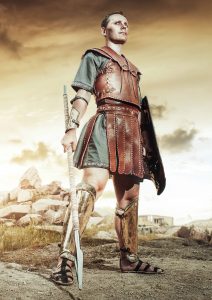 A legitimate concern and expectation in modern law enforcement is that an officer’s use of physical force be ethical and lawful. The proliferation of cameras and footage of LEO force encounters is an excellent resource. These modern resources have shown others what busy beat cops have always known — officers rarely use any physical force at all, and when they do, it is often not “pretty.” Consider the following quote from Charles H. Webb, Ph.D.:
A legitimate concern and expectation in modern law enforcement is that an officer’s use of physical force be ethical and lawful. The proliferation of cameras and footage of LEO force encounters is an excellent resource. These modern resources have shown others what busy beat cops have always known — officers rarely use any physical force at all, and when they do, it is often not “pretty.” Consider the following quote from Charles H. Webb, Ph.D.:
“There is no nice way to arrest a potentially dangerous, combative suspect. The police are our bodyguards; our hired fists, batons and guns. We pay them to do the dirty work of protecting us. The work we’re too afraid, unskilled or too civilized to do ourselves. We expect to keep the bad guys out of our business, out of our cars, out of our houses, out of our faces. We just don’t want to see how it’s done.”
Although statistically officers rarely use any force at all, and there is no way that one could make a statistical case of any “epidemic” of unlawful force, there are times when uses of force are not within the bounds of policy or law. Video often will capture when it all goes wrong. Civilians watching such video will often watch an officer overreact or use ineffective force and immediately conclude that the issue for the officer is that they have a “warrior” mentality. This idea that a warrior mentality causes inappropriate, outside of policy or unlawful uses of force has crept into the LEO community and at times gets promoted by officers in upper staff positions. In response, there has been a movement by staff to say they need officers to be “guardians” and not “warriors.” This is ironic to me when you consider where I believe some of the blame rests for these poor uses of force. Some blame rests with those who lead agencies and provide very little training to those who go in harm’s way.
The first issue I have with this movement is the idea that officers will somehow use force more appropriately if they are guardians, rather than warriors. There is a huge misconception that video of unlawful beatings are videos of warriors in action. In addition, the inference that if officers had been “taught” they were guardians rather than warriors, somehow the force would have been appropriate is completely false. The truth is, these officers are not warriors, nor are they well trained. What is actually happening in almost all of the videos that show officers doing a poor job with a use-of-force application, or making poor use-of-force decisions, is that we are watching poorly trained officers attempt to make critical decisions under elevated heart rates and stress. We are not seeing a highly-trained “warrior” aggressively smashing random suspects. We are seeing equipped officers wearing badges and gun belts with academy training and limited annual training. They have gear, weapons and a directive to go forth and handle violent confrontations and individuals. Their equipment and orders do not make them “warriors,” however. “Warrior” status, if there is such a thing, can only be achieved through hours and hours of training and experience. We are watching officers deploying force, and they are not great at it. Shoot, they are not even good at it. We are not watching warriors in such videos. We are watching ineffective force by poorly trained officers.
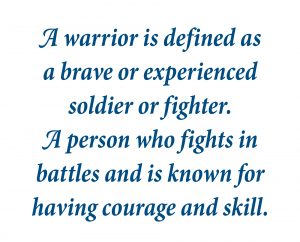
In Webster’s Dictionary, a warrior is defined as a brave or experienced soldier or fighter. A person who fights in battles and is known for having courage and skill. Urban Dictionary states that a warrior is a man or woman who is a fearless, strong and skillful fighter. Urban Dictionary ironically states that warriors are lacking in our modern times. I agree with that wholeheartedly. The status of “warrior” is one of the most overused pronouncements, and people are often denoted as such by those who are not one. Long ago, Heraclitus understood how rare warriors actually are.
“Out of every one hundred men, ten shouldn’t even be there,
Eighty are just targets, nine are real fighters,
And we are lucky to have them, for they make the battle.
Ah, but the one, one is a warrior, and he will bring the others back.”
In the poem, Heraclitus correctly points out that warriors are rare. He figures potentially one out of every 100 men. He also correctly states the warrior’s purpose, which is to bring all the others back. In our society, when the warrior is needed, it is to keep all the others safe and bring them home alive.
The attack on the “warrior culture” is that warriors are prone to violence, have an “us versus them” mentality and that they randomly attack innocent “victims.” The warrior is also prone to be violent as that is the only option they think of. In essence, they are a hammer and everything else must be a nail. Although I know all of these things to be false from hours upon hours of training and experience, I decided to just randomly punch in a few questions in a Google-type search about warrior attributes.
My first question was, “What does it mean to be called a warrior?” One answer was that it is a “person who is known for being involved in warfare.” Another answer was “someone who fights in a battle and is known to have courage and skill.” Yet another was “someone who is engaged in some struggle or conflict.” None of the answers were one who abuses others, or one who is prone to violence or one who victimizes the peaceful.
The next question I posed was, “What makes you a warrior?” One answer given was: “The warrior has mastered himself in body and mind. His power is rooted in self-control. He knows when to be aggressive and how aggressive to be.” How has the warrior mastered himself? Through diligent, consistent, ongoing, strenuous training and actual application in the field. Most officers neither receive, nor seek, any of the above in regards to regular and ongoing training. Even if the “warrior culture” were a thing and being infused into officers at the detriment of communities across the U.S., exactly when and where is this happening?
I have been teaching police defensive tactics and use of force to departments around the nation and at national and international conferences since 2006. The majority of officers and departments nationwide provide police officers 10 hours or less of defensive tactics and use-of-force training annually. Less than 10 hours a year. Exactly when and how are these “warriors” being developed? I think civilians, even the ones complaining about the “warrior culture,” would be shocked to see the actual lack of anything resembling “warrior training” in police departments nationwide. Many departments don’t allow contact in combatives training for fear of injuries occurring, and very few physically tax officers, inducing an elevated heart rate (similar to what they may experience in the field) and then ask them to fight through it, use force and make appropriate decisions. Training like that mentioned above would actually produce some of the warrior attributes I have talked about throughout this piece, and communities around the U.S. would be better for it.
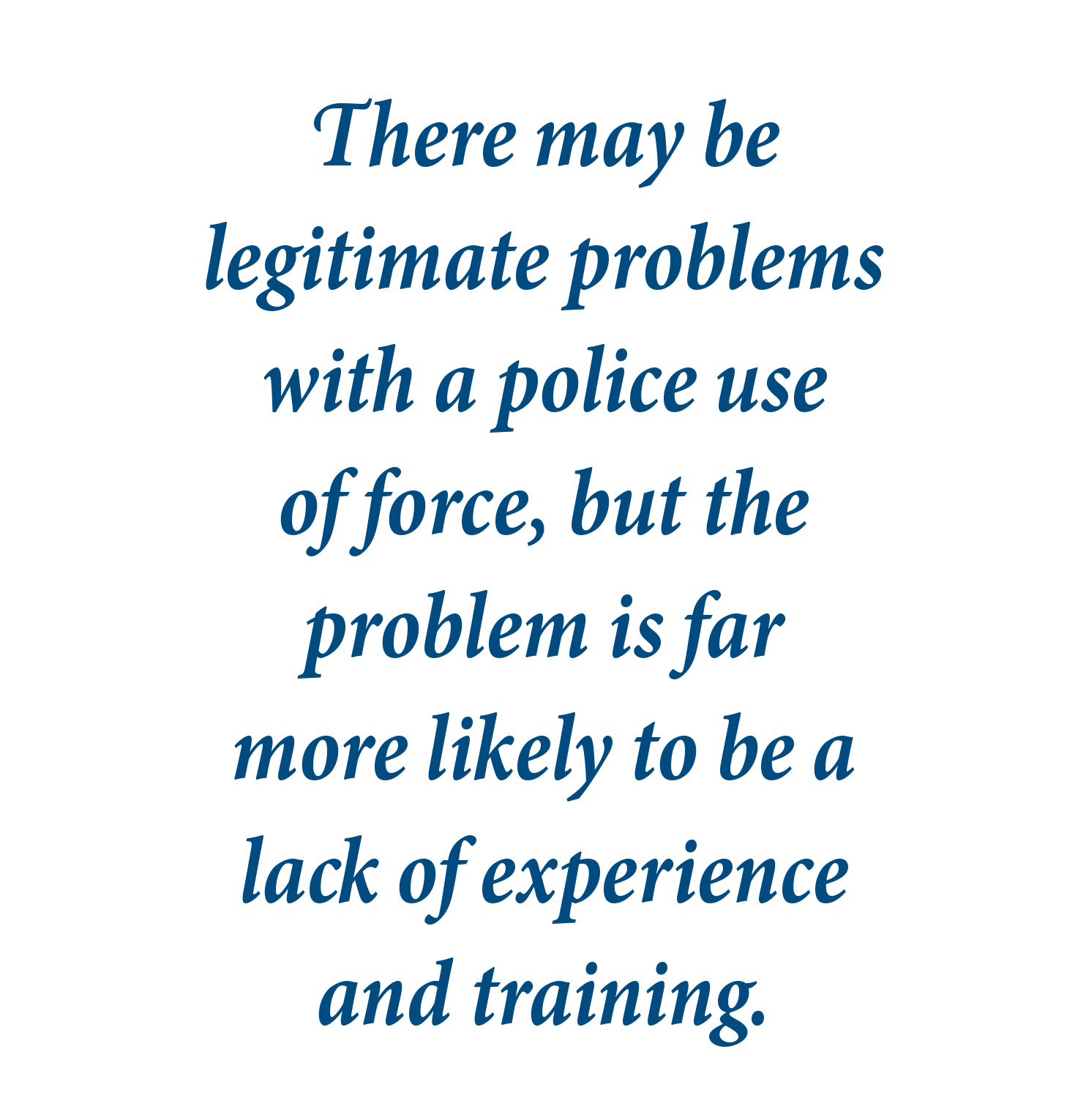
My next question was, “What is the purpose of a warrior?” The answer said, “The warrior, for us, is one who sacrifices himself for the good of others. Being a warrior is more than about fighting. It is about service to the community.” Throughout history, one who is a warrior or has warrior attributes has been viewed positively. The warrior spirit is one that battles through adversity. A single mom who is a warrior for her kids generates admiration. Someone who fights cancer is a warrior and is admired, and we cheer for that person. We would all do well to stoke the warrior fire within us, unless we happen to be a police officer. Then the word “warrior” means abuse, mistreatment and attacking the weak.
This bastardization of the word “warrior” reminded me of another word. I looked up “bullying” in Webster’s Dictionary. It stated that bullying meant “abuse and mistreatment of someone vulnerable by someone stronger, more powerful, etc.” These would be the actions and behavior of a bully. I would disagree that officers routinely resort to bullying, but certainly at times it does happen. Whether it happens or not, I refuse to allow examples of bullying to be characterized as examples of warriors doing warrior things. I did not see any characterization of warriors as bullies in action, deed, practice, description or definition. If we see an awful video of police using force, many are quick to both characterize and criticize the event as “warriors run amok.” Pure nonsense. There may be legitimate problems with a police use of force, but the problem is far more likely to be a lack of experience and training — hence, not a warrior — than a super-squared-away and experienced expert at combatives and defensive tactics (definitely a warrior).
The favored word from many police administrators is “guardian.” I sought out a dictionary definition for the word “guardian” as well. It is one that guards. A custodian. One who has the care of the person and property of another. Certainly, officers serve as guardians from time to time, but to suggest that performing this task under the threat of violence and saying, “I am a guardian, as opposed to a warrior, and that distinction will make using force ‘pure’ or appropriate in some way” is laughable.
Ultimately, I don’t care if you call an officer a warrior or guardian, as neither title will produce effective, ethical and lawful force. What produces a high-level performance is continued, consistent, ongoing, training and experience. The result over time could be called a warrior, a guardian or whatever you prefer. No matter what you call them, you will produce professionals. Professionals who are experts at using force when needed. A quote I saw once that captures this is, “Violence is a last resort; but I am great at it.”
If you are a professional officer, you must have the capability to use force and violence ethically and effectively. To me, anyone who can do this is the definition of a warrior.
The truth is if you are a civilian, there is a good chance you have never met anyone who has reached warrior status, as it pertains to using force and violence ethically, lawfully and effectively. If you are an officer, you have probably been blessed to meet a couple. If you are an officer, your status as one (you completed an academy, they gave you a badge and gun, you do your “annual” training, etc.) is not confirmed or verified. Most officers fit in this category. If people are concerned officers are “becoming warriors” and that it’s a bad thing, they can rest easy. There are very few true warriors in the world, and most officers will never reach that status. In fact, without dedicated, ongoing, focused and consistent training on your own, you will not reach that status.
I know I have been training consistently for over 20 years and I am still a work in progress. By Heraclitus’s thinking, I believe I may be one of the nine, but I am not “the one,” although I have been blessed to work with a few. We certainly don’t have a warrior epidemic in policing, but we would be better off if we did. The issue we do have in regards to use of force is ineffective force by poorly trained officers.
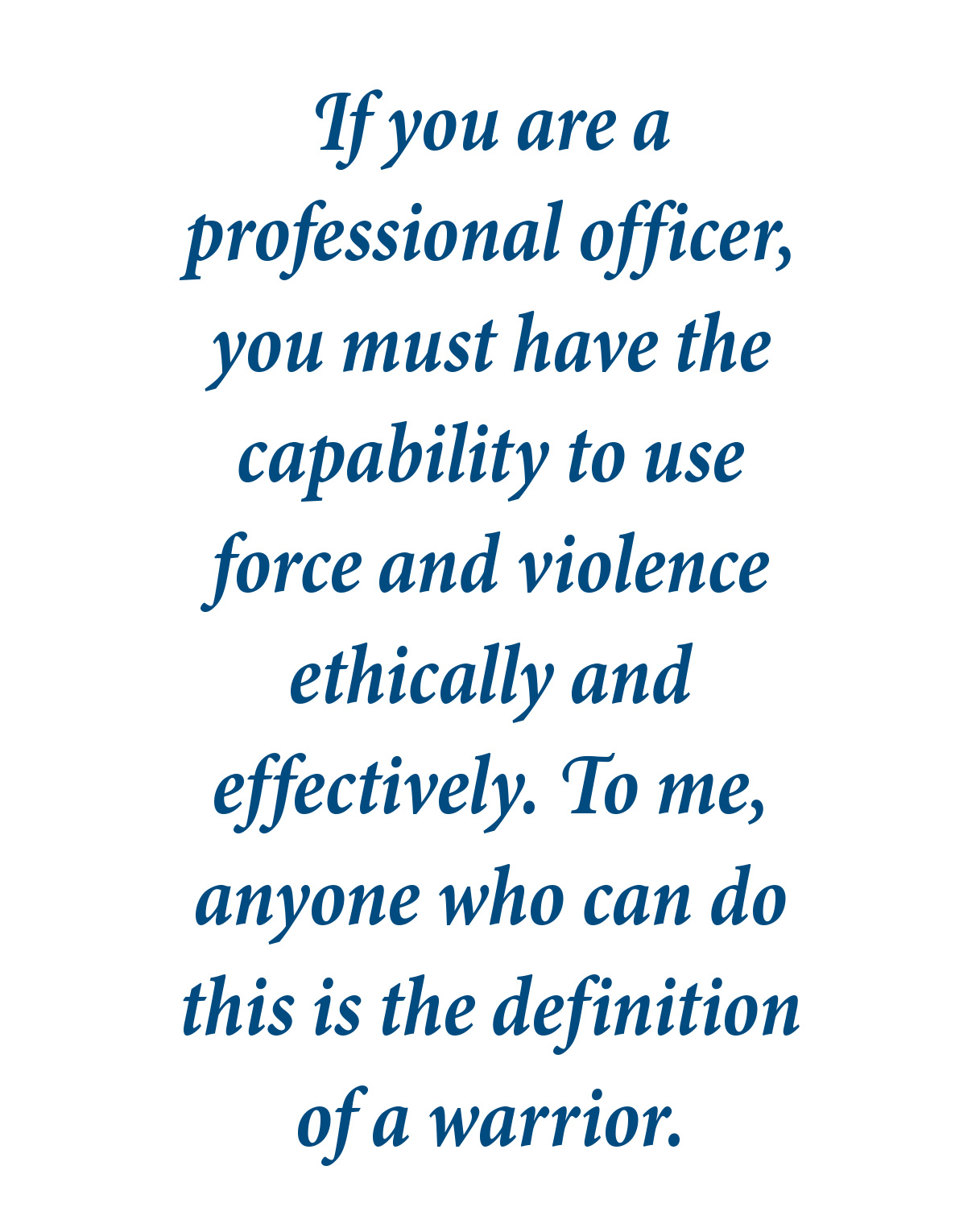
Ineffective force gives the illusion of excessive force. Many folks, upon seeing that illusion, jump to the conclusion that a “warrior culture” is cultivating the craziness they are watching. The truth is, there are no warriors in the videos they are watching. They are watching beginners at use of force with gadgets and tools trying to “help” them.
A major problem is many of them (the officers) don’t even know they are not the “warrior.” Over 50,000 officers are attacked annually, with over 16,000 injured. In a typical year, more than 120 officers will die, with 50 to 60 of the deaths being attributed to felonious activity by suspects. The deaths via gunfire have escalated over the last few years. Despite these high-risk engagements, many officers are lulled to sleep with repeated contacts with no violence, and several smaller “skirmishes” with no significant injuries.
The officer might think he is the warrior! He may feel this is all going his way because he is awesome. He may feel that way, until he doesn’t. Until he gets exposed by the skill, determination and aggression of a committed adversary. Then, the officer will suddenly understand a universal law. There is no way to become an expert, a professional, in anything without consistent hard work and practice. Imagine having a goal of being a D-1 college baseball player. To accomplish your goal, you attend tryouts for the freshman baseball team and make the team. Then you simply spend the minimum time practicing. You show up for games. You win some and lose some. Over time you think, “Hey, I got a handle on this baseball thing.” You think you could hit college pitching until you go against a D-1 pitcher. Someone who spends time working on his own, someone who has no offseason. Someone who is not even “the one” (remember D-1, not MLB), but someone who is a real fighter. The person will expose you. Suddenly, you will realize you don’t know what you don’t know.
This debate of the problem with American police use of force being attributed to the “warrior” is similar. You probably don’t even know a warrior. Who loves the warrior? Only the warrior loves the warrior, or at least those who have known him and appreciate what he has sacrificed to be one. Those who appreciate what he will give to bring all the others home. God bless the warrior and those like him. We would all be better off if there were more of them.

